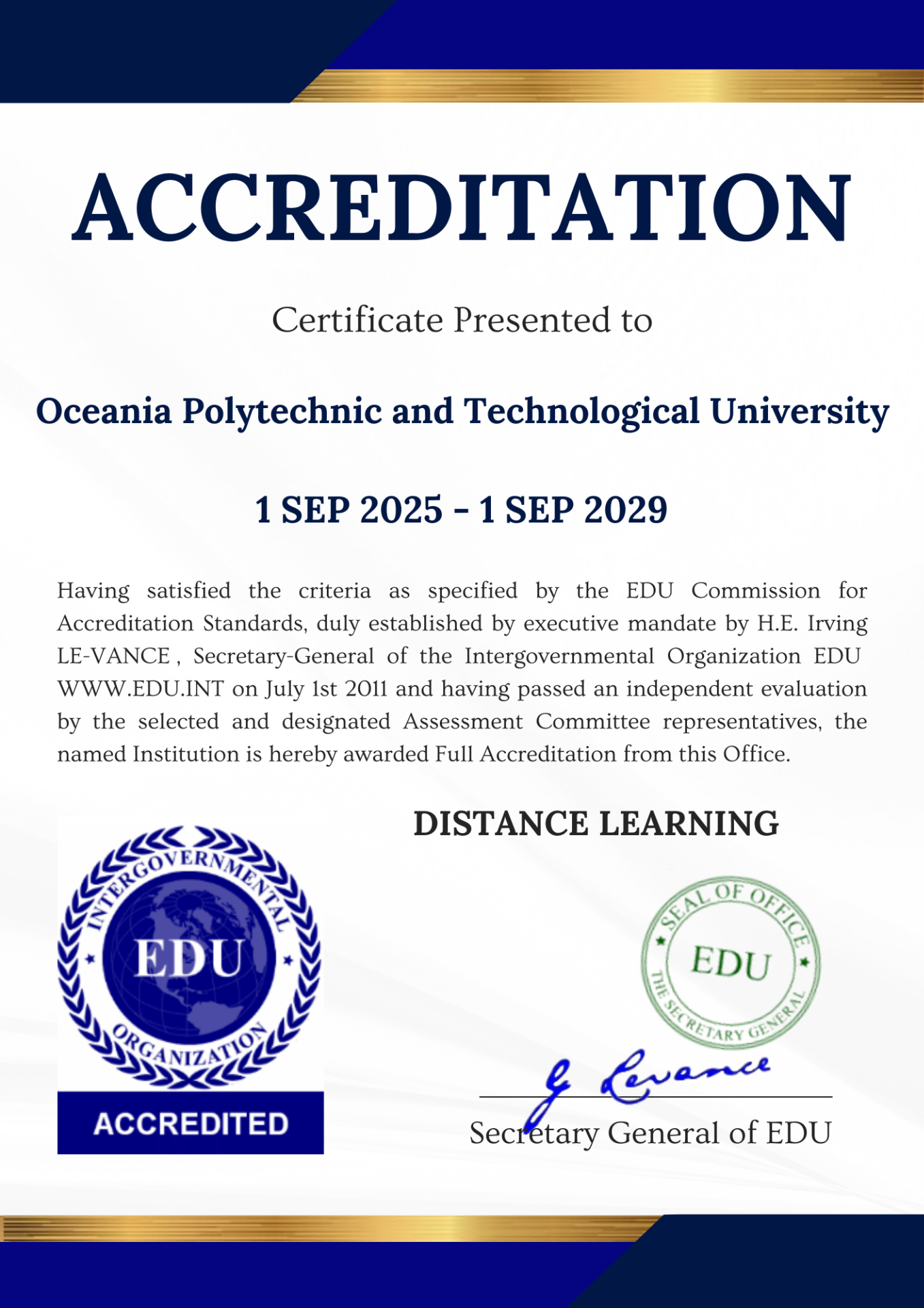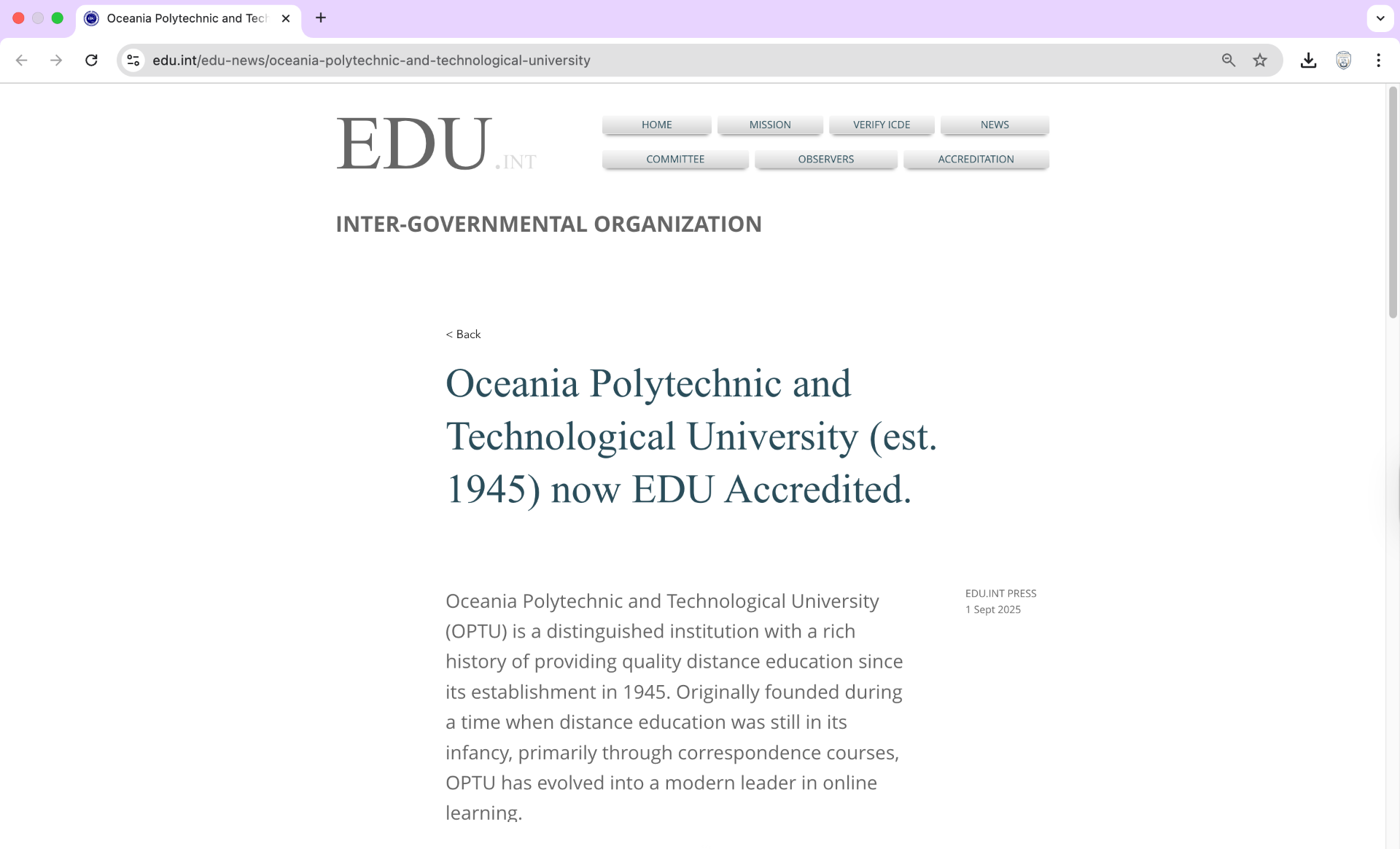OPTU Awarded Full Accreditation by the EDU Commission for Accreditation


Oceania Polytechnic and Technological University has been granted Full Accreditation by the EDU Commission for Accreditation Standards, an intergovernmental organization committed to advancing global education and sustainability.
URL: https://www.edu.int/edu-news/oceania-polytechnic-and-technological-university
This achievement reflects the university's steadfast commitment to academic excellence and international collaboration. Accreditation from EDU strengthens the university's global standing, affirming that its programs meet rigorous international benchmarks. For students, it ensures that their qualifications carry greater credibility and recognition among employers and academic institutions worldwide. Moreover, it opens doors to international partnerships, resources, and opportunities for cross-border engagement, enriching both learning and career prospects. This recognition reaffirms Oceania Polytechnic and Technological University's dedication to delivering quality education and preparing its students to thrive in an increasingly interconnected world.
Authorization
EDU, an intergovernmental organization of international standing, was established under the authority of the Ministry of Education of the Republic of Palau. Its mandate and operations are aligned with the educational values, standards, and frameworks set forth by UNESCO, thereby reinforcing its role as a credible body for advancing global education and accreditation.
Ministry of Education, Palau - CHEA Directory: https://www.chea.org/international-directory/ministry-education-20
Ministry of Education - UNESCO/MOE Framework Agreement: https://www.palaugov.pw/executive-branch/ministries/education/
EDU Framework Agreement Establishing an Intergovernmental Organization Promoting International Education and Understanding: https://www.palaugov.pw/wp-content/uploads/2013/09/UNESCO_MOE-Framework-Agreement.pdf
Background
'The EDU Commission for Accreditation', was duly established by executive mandate by His Excellency, G.Irving Le-Vance , Secretary General of the Intergovernmental organization EDU on July 1st 2011. On 1st January 2012, after extensive input and advice from numerous educational professional from several countries, the Commission formed the 'FORMALIZATION FRAMEWORK AGREEMENT FOR RECOGNITION AND ENDORSEMENT OF THE EDU ACCREDITATION SYSTEM'. EDU Accreditation is a simplified form of Accreditation available for Schools, Colleges, Universities and other Institutions of Learning around the world who wish to Prove Legal Status and Competency to Operate. Although available for application from schools all over the world, EDU Accreditation is particularly advantageous to institutions in developing countries. All too often, schools in developing countries are excluded from membership of foreign accreditation agencies, for the most part, due to financial constraints, or an inability to adhere to some of the complicated 'First World' policies so prevalent in most accreditation agency policies today. The EDU Accreditation System was developed to ensure that institutions in developing countries have a fair opportunity of membership based on their legal recognition, respectability and competence in their home country or jurisdiction of operation. EDU Accreditation allows Employers, HR Departments or other 3rd Parties wishing to verify the legal status of a foreign institution, to do so quickly without additional research.
EDU Accreditation Standards
EDU Accreditation is a simplified form of Accreditation available for Schools, Colleges, Universities and other Institutions of Learning around the world who wish to Prove Legal Status and Competency to Operate.
Although available for application from schools all over the world, EDU Accreditation is particularly advantageous to institutions in developing countries.
All too often, schools in developing countries are excluded from membership of foreign accreditation agencies, for the most part, due to financial constraints, or an inability to adhere to some of the complicated 'First World' policies so prevalent in most accreditation agency policies today.
The EDU Accreditation System was developed to ensure that institutions in developing countries have a fair opportunity of membership based on their legal recognition, respectability and competence in their home country or jurisdiction of operation.
EDU Accreditation allows Employers, HR Departments or other 3rd Parties wishing to verify the legal status of a foreign institution, to do so quickly without additional research.
Official Website: https://www.edu.int/
